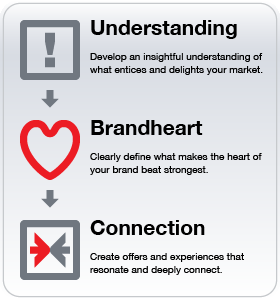Brandheart on Business Vs A Brand

Are you running a business-or a brand? Take a minute to ponder this question.
But before you jump in let us guide you a little by sharing the Brandheart view of the fundamental characteristics of a business first and then a brand immediately after.
Businesses tend to be unfocused. They change core brand building strategies and tactics, even their positioning regularly in the hope of finding that 'magic' solution that delivers what they are focused on most, revenue growth.
They do this because they're driven by the need for immediate gratification-so if something doesn't work instantly they tend to move on quickly to the next 'big' idea.
Unfortunately this pattern of constant change makes the business appear to the customer as 'schizophrenic' confusing them and making detachment an inevitable outcome.
Businesses also tend to get deeply immersed in process and operational tasks. Glen Campbell, founder and managing director of Brandheart calls this 'process spaghetti'.
This usually starts with the leader who tends to be 'flat out' working in the business rather than on it. Employees tend to establish their behaviour on the leaders and follow suit-so everybody is very busy focused on process.
Having a culture embedded with this kind of behaviour, while probably not consciously intended, shifts the focus away from the customer, which of course is a recipe for disaster.
Brandheart also notes that businesses also tend to offer products and services that are not well differentiated which force them to build customer demand and the sales pipeline by bargaining purely on price.
Right now you'll see in the media everywhere 'hard sell' promotions such as deep cut discounts, give-always and extended finance terms.
Equally you'll see salespeople, when pushed, go straight to a 'discount' long before they showcase the features and benefits and how they fulfill an emotional desire.
These tactics, while potentially generating some short-term revenue, only serve to position their business as a 'commodity trader' where price becomes the only motivating enticement.
Constantly pursuing this approach not only reduces margins but also trains the customer to buy rationally; meaning they purchase only from you when your discount is bigger than that promoted by your competitors-or by you previously.
This engenders a transient customer base of addicted price hunters-as opposed to a community of brand loyalists-not a great foundation for the future growth of a great and profitable brand.
Take a moment to examine you own business or those around you and you will find many, if not most businesses are acting in this way right now.
This 'desperation marketing' represents massive potential for you to leap frog them, but only if you start behaving like a category leading brand.
Let's examine the Brandheart way of doing that and we will do that by asking a series of provocative questions!
Simply answering 'yes' or no' in your mind and let's see how you fare at the end.
Do you have a clear, compelling, inspiring and motivating vision, core purpose and values that are well known and understand by you and your team-and are you living by these every day without compromise?
Is your market position well defined and your brand promise clearly articulated and understood firstly by your team and then by your customers?
Are you focused on deeply understanding your customers needs, wants and desires-so you can develop superior products and services through Personal Branding that are not only relevant and important to them but engage and excite them?
Do you have your team all working in harmony and happy so that when a customer engages at any touch point they have the experience you intended-or even better?
Do you have outstanding advisors who have the depth and breathe of experience or are you being pushed into different directions and promotional activities that serve other agendas?
Are you consistent to your Business branding story yet fresh in your promotional activity or are you constantly changing your promise, proposition and offers leaving your employees and customers confused?
And finally, are you evolving your business based on robust insights or are you drowning in a sea of information-or misinformation?
If you ended up saying 'No' to just a few of those questions then it's more than likely you are running a business rather than a brand and that should be of great concern to you. Maybe it's time to make some changes accordingly.
Understanding what constitutes a powerful and enduring brand is something every business leader should make a personal mission to know.
After all, business right now is more Darwinian than ever before and only business leaders that know how to build a great corporate branding will certainly be the 'fittest' and they will be the few that not only survive, but thrive.
